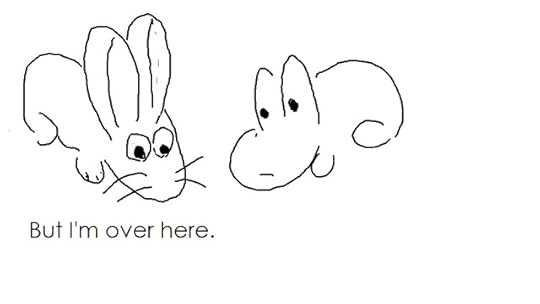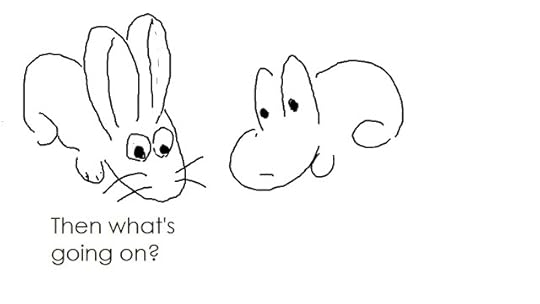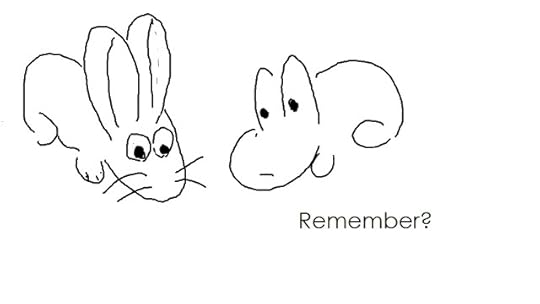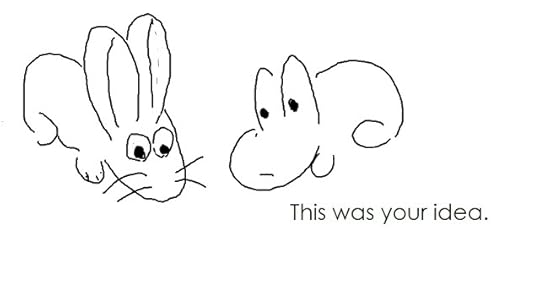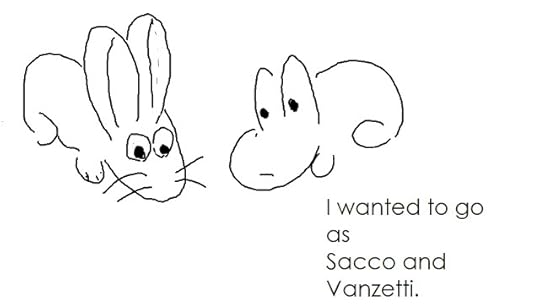Briane Pagel's Blog: Thinking The Lions, page 30
November 7, 2015
Books(h)elf: The Illustrated "Longitude."
Many years ago, I sold off nearly all my 'real' books. Since then I have from time to time gone out to purchase a new copy of a book that I can't get out of my mind. I figured I would start telling the stories of these books, and how they relate to my life.
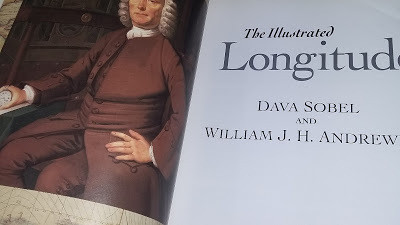
The Illustrated Longitude ______________________
Sometimes I get depressed that I will never invent a marine chronometer.
I came to Madison for law school in 1995. This was a year or so after I’d gotten skinny, and I hadn’t yet adapted to the idea that I could be considered good-looking, or popular. Good-looking, popular, and, although I didn’t know it yet, being capable of designing and building a marine chronometer, were things I had always wanted to be.
There is a thing in me that will not let me read things without wanting to experience those things. This happens most often with things that I think could be done with a minimum of effort, and, usually, cost, although cost factors into these things less than the effort, and the need to do them. The (partial) list of things that I have wanted to do after reading about them includes:n Grow superhot chili peppers.n Raise pigeonsn Raise chickensn Play bagpipes
And, of course, build a marine chronometer.
Longitude is about a man who built a marine chronometer and one of the things I like about this book is that I get to be the kind of person who says things like it’s a book about the guy who built the marine chronometer and then, when people look at me as though I am the sort of person who says things like that, I have the opportunity to add that it is more interesting than one might think, or tell the story that I think opens the book about how the Royal Navy once ran aground because nobody knew how far east (or not) they were, and it turned out they were a lot more east than they’d imagined.
Longitude is also partially the story about how hard it is, period, to figure out whether we are here or there when here and there are synonyms for east and west. I found it sitting on the shelf at the UW Bookstore down on the library mall, and something about the old-timey cover of the book, as well as the title, made me stop and pick it up.
That might have been the start of my fascination with science, and anything that sounds vaguely scientific or mathematical, or at least that fascination was in its nascenscy at the time. I had only a year earlier taken the course in astronomy which (I have liked to say for more than two decades after that) might have, had I taken it earlier in my college career, led me to be an astronomer.
The story of astronomy that I tell, and it might be the truth, is this: I tell people that throughout my undergrad years at the UW-Milwaukee, my advisor kept nagging at me to take astronomy. This is how I remember it. I also remember that advisor tell me that I would not get into the University of Wisconsin Law School. Both of those memories may or may not be true. I distrust memory nowadays. I am, as I sit here, 46 years old, three weeks before Hallowe’en in 2015, not sure how much I remember about my life, let alone how many of those memories are accurate, rather than invented, distorted, edited.
But they are my memories.
Memories, in that way, are like nonfiction: we can’t be sure how much of it is true. The importance of the Astronomy Memory is that I get to say to people how for years my advisor had been saying that I should take astronomy. Political science majors had to take a certain amount of natural science credits, and each year I would go to my advisor to ask what credits I should take to graduate on time, ‘on time’ being ‘by the time I was 25.’ She would suggest astronomy and I would say no and then we’d go about our semester.
Senior year, 1994, I took astronomy in the fall semester, and loved it. I found out, for example, why every year in the fall the UW-Milwaukee campus had little bowling balls or marbles or whatnot labeled after the planets scattered around it: it was to demonstrate the relative size and distance of the solar system. I saw the professor dump liquid nitrogen from a container right in front of me – I sat in the front row of that class – and it evaporated, or sublimated, or something, before ever hitting those students up front. I learned constellations and red shifts and really probably a lot more but that’s all I remember.
I loved that class. I found it phenomenally interesting and studied hard for it and for the next 21+ years I would tell people that if I had taken the class earlier in my college career, I might have become an astronomer.
(There are no astronomers, according to a website I read a while back. They are all astrophysicists, now.)
That might have been the transition between my blaming everyone else for all the things I didn’t know, or do, or experience, to blaming myself: the story I told about astronomy. For most of my life, I said things like if I’d had good high school teachers who made the subjects interesting I might have studied harder or loved something more or been something different. That is a fancy way of saying people should make me do better in life, and I don’t say that anymore. Now, I say that if I’d been more motivated and studied harder and paid better attention I might have been an oceanographer (as I once dreamed) or perhaps astronomer or anything other than what I am at the times I am dissatisfied with what I am. I have come to realize that I am the reason I am what I am. Maybe it would have been easier to be a different version of me if I’d had more help: if I’d had, say, a trust fund or parents who didn’t spend most of my childhood fighting or if I hadn’t been fat and had a lazy eye and shy or if we’d lived in New York City or if if if if if if but also lots of people have those things and yet they invent games or become astronauts or write bestsellers or simply do what they want.
So I could have, too, and it didn’t matter if Ms. Kaiser in 11th grade or whatever hadn’t been a scintillating physics teacher. It mattered that I hadn’t bothered to understand that the teacher isn’t as important as the student. Life is what you make of it. Maybe that was another lesson I learned from the man who invented the marine chronometer, three times.
I recall seeing the title and picking up the book. I don’t usually read nonfiction. I like to say that life is nonfiction, so why would I need to read it, but that’s not even a good thing to say. It’s not like all nonfiction is The Sims; it doesn’t just imitate or spit back the life I lead. (I recall the time one of our kids tried to teach me to play Sims on the computer. After creating my avatar, I asked her what I had to do next. She said I had to get a job and use my money to get a house and furnish it. I said I’m already doing those things and never played again.)
Nonfiction just seems less exciting to me than fiction. Telling me that something is nonfiction makes me not like it, right off the bat, or at least like it a little less. Which makes it sort of weird that I found Longitude in the first place, since it’s unlikely I was in the nonfiction section.
The copy of Longitude I bought 20 years ago was one of the books I sold, back when. The copy I have now is an illustrated guide my mom gave me for Xmas one year. I used to leave it on an endtable, with the fancy dust jacket on it, back when I left books out for people to see when they came over, which was also back when we had the occasional knickknack in the house, and pictures on the walls, and people over. Those things have, for us, gone the way of the 1990s themselves, exiting only in the past. I no longer have the dust jacket, either. Just the book, with its plain green cover.
I’ve never actually read the illustrated version of the book. Longitude was one of the books I read only once, and having read it before getting the copy of the book as a gift, I never read it again. There didn’t seem to be a need to. I used to re-read books all the time, when I was younger. Back then I had more time to read, as a result of not having many friends and not being very social and never having anything else to do. There are books I bet I’ve read 5, 6, 7 times in my life, which doesn’t seem like a lot, but a book is a pretty hefty investment of time. A book, straight through, would probably take five or six hours. In fact, I know it would, if not longer, for a couple of reasons. First, I listen to audiobooks a lot, now, and they all take 5 or more hours to get through. (I listen only to the unabridged version of books. Why would I want to listen to the abridgedversion? Who wants to read, or listen to, part of a book? What is the point of that?)
Secondly, not very long ago I spent much of the day re-reading Spellsinger by Alan Dean Foster, another book on the shelf. I was reading it for reasons I don’t fully understand. I was in an argument with Joy and left the house angry that morning, taking with me my phone and laptop and the book Spellsinger, which I then read most of while sitting in the car; I got about 75-80% through it just in the morning, with the gray day around me while I sat in my tiny car on the side of the road near where we used to sometimes go walking, during her lunch, when she used to work at a firm near Lake Monona.
If a book takes so many hours to get through, to re-read a book requires that the book be one worth re-reading, and also that you have enough time to do so. I never feel as though I have enough time to re-read books, these days: I get maybe 1 hour a day to do what I want and most of the time I am too tired to read anything more thought-provoking than Gawker, so re-reading books is not high on my list of things to do.
But even back when I could go back and revisit a book I’d read, I don’t think I’ve ever done that with nonfiction books. Certainly not Longitude. I’m not even sure why Mom gave it to me as a gift. Probably because I’d mentioned it and/or told her how much I’d loved it. I did love it; it was a great book, very interesting, at least the 1/20thof it I remember now.
The parts of Longitude I remember are:-- The navy running into the coast.-- The thing about how they used to use ‘powder of sympathy’ to try to tell their longitude, by stabbing a dog in London, or at sea, or both.-- How George Harrison built several models of the chronometer but still didn’t win the big prize.
-- How it’s difficult to build a clock that will work at sea what with the pitching of ships as well as the different humidities and all.-- The part about how sailors had eye patches because they had to use a sextant to gauge their position which required them to look up directly at the sun.
That’s not all that much, even for such a short book. There has to be more to the book than that, I figure..
I expect that Mom gave it to me for the same reason almost all presents in my family were picked out: because it was something they knew about me. In our family, once you learn a fact about someone, you run with it. You give gifts centered on that fact that you know. For example, before I went to law school I bought a Curious George t-shirt. I wore it around my family once. Then, during law school and after, I was gifted a series of monkey-themed presents, including a monkey Beanie Baby, a “See No Evil” lamp that I still kind of have, I think, and two ceramic statues of monkeys dressed in American Revolutionary War garb. I really liked those last two, which used to sit on a shelf just inside the door of the first apartment Joy and I ever shared. I don’t know where they are anymore. But that’s how gift-giving in my family worked: if you knew a fact about a person, you built a persona around it and forced the person to be that fact. It is why my dad used to give presents themed like snowmen to Joy: he noticed that she had bought some ornaments based on snowmen made out of Smores. It was why my family gave me a telescope and subscription to Astronomy magazine as a law school graduation present: because I’d mentioned that I liked astronomy class.
This began with my mom and the elephants. Everyone gave my mom elephant-themed gifts, mostly just actual elephants of various sizes. This is because of a dream she had when she was a little girl, she always said. She told her father about the dream, which featured a tiny pink elephant. Her dad, she said, then would from time to time bring her a stuffed elephant or a toy elephant or something, and ask is this the elephant you saw? It never was, but over the years more and more people got into it, and gave her elephants of varying shapes and sizes and makes and models. I did the same; when I went to Morocco in 1994, I spent much of my souvenir-shopping time looking for a fil kbir, or big elephant. I finally found one, too, in Fez, down a long winding set of alleys in a tiny back room. I had been asking for a fil kbir at various stands in the woodcarving section of the suq, and nobody had one big enough. One shopkeeper asked me to follow him. So I did, because I was stupid. This didn’t end badly, but it was kind of dumb nonetheless, to just wander after somebody away from your group in a strange city where you speak none of the operative languages better than simply the ability to order a coffee. Coffee, in Arabic, is quhwa. Coffee, in Morocco, is drunk in tiny cups like espresso. I grew used to that because I grew tired of trying to order quwha kbir.
I followed him, and he led me through the tents in a winding ranging walk, then down an alleyway, then down another. I was lost by then, and also wondering if I was going to be mugged or maybe killed or both, although both shouldn’t matter much: if I had been killed I probably wouldn’t care much about having been mugged, too.
The guy finally stopped at a small door, which he opened and beckoned me in. Inside it was pitch black, or so I thought. I stepped inside (again: I am stupid, and also I was too afraid to look like a coward in front of this guy). It was so dark I couldn’t see the walls. A brilliant shaft of sunlight came through a hole in the roof, and a man was kneeling in the near-dark. The two Moroccans talked quickly, too quickly for me to catch anything other than fil kbir, but after a bit the man kneeling in the dark took some wood and began whittling and hacking at it with a knife. In less than 15 minutes, standing in the close, stuffy, overly-hot, nearly dark room, he had carved an impressive fil kbir, nearly as big as my torso, and had started staining it. I had to wait while the stain dried enough for me to carry it. I made what small talk I could with the men, with their limited English. Then we went back to the booth and I paid for the statue, which I would lug in my suitcase for four more weeks before bringing it home to Mom.
I don’t know where that fil kbir is now. I think it was in her house after she died, six years ago, but I didn’t take anything of hers (other than the life insurance money she left me to pay back money I’d lent her over the years). I sometimes wonder what happened to it. It was probably thrown out by my stupid siblings, who had no idea that (in my mind, at least) I had nearly died getting that statue for mom.
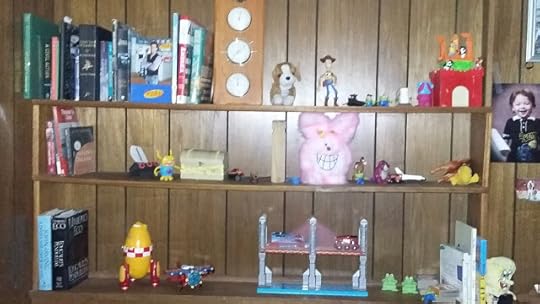

The Illustrated Longitude ______________________
Sometimes I get depressed that I will never invent a marine chronometer.
I came to Madison for law school in 1995. This was a year or so after I’d gotten skinny, and I hadn’t yet adapted to the idea that I could be considered good-looking, or popular. Good-looking, popular, and, although I didn’t know it yet, being capable of designing and building a marine chronometer, were things I had always wanted to be.
There is a thing in me that will not let me read things without wanting to experience those things. This happens most often with things that I think could be done with a minimum of effort, and, usually, cost, although cost factors into these things less than the effort, and the need to do them. The (partial) list of things that I have wanted to do after reading about them includes:n Grow superhot chili peppers.n Raise pigeonsn Raise chickensn Play bagpipes
And, of course, build a marine chronometer.
Longitude is about a man who built a marine chronometer and one of the things I like about this book is that I get to be the kind of person who says things like it’s a book about the guy who built the marine chronometer and then, when people look at me as though I am the sort of person who says things like that, I have the opportunity to add that it is more interesting than one might think, or tell the story that I think opens the book about how the Royal Navy once ran aground because nobody knew how far east (or not) they were, and it turned out they were a lot more east than they’d imagined.
Longitude is also partially the story about how hard it is, period, to figure out whether we are here or there when here and there are synonyms for east and west. I found it sitting on the shelf at the UW Bookstore down on the library mall, and something about the old-timey cover of the book, as well as the title, made me stop and pick it up.
That might have been the start of my fascination with science, and anything that sounds vaguely scientific or mathematical, or at least that fascination was in its nascenscy at the time. I had only a year earlier taken the course in astronomy which (I have liked to say for more than two decades after that) might have, had I taken it earlier in my college career, led me to be an astronomer.
The story of astronomy that I tell, and it might be the truth, is this: I tell people that throughout my undergrad years at the UW-Milwaukee, my advisor kept nagging at me to take astronomy. This is how I remember it. I also remember that advisor tell me that I would not get into the University of Wisconsin Law School. Both of those memories may or may not be true. I distrust memory nowadays. I am, as I sit here, 46 years old, three weeks before Hallowe’en in 2015, not sure how much I remember about my life, let alone how many of those memories are accurate, rather than invented, distorted, edited.
But they are my memories.
Memories, in that way, are like nonfiction: we can’t be sure how much of it is true. The importance of the Astronomy Memory is that I get to say to people how for years my advisor had been saying that I should take astronomy. Political science majors had to take a certain amount of natural science credits, and each year I would go to my advisor to ask what credits I should take to graduate on time, ‘on time’ being ‘by the time I was 25.’ She would suggest astronomy and I would say no and then we’d go about our semester.
Senior year, 1994, I took astronomy in the fall semester, and loved it. I found out, for example, why every year in the fall the UW-Milwaukee campus had little bowling balls or marbles or whatnot labeled after the planets scattered around it: it was to demonstrate the relative size and distance of the solar system. I saw the professor dump liquid nitrogen from a container right in front of me – I sat in the front row of that class – and it evaporated, or sublimated, or something, before ever hitting those students up front. I learned constellations and red shifts and really probably a lot more but that’s all I remember.
I loved that class. I found it phenomenally interesting and studied hard for it and for the next 21+ years I would tell people that if I had taken the class earlier in my college career, I might have become an astronomer.
(There are no astronomers, according to a website I read a while back. They are all astrophysicists, now.)
That might have been the transition between my blaming everyone else for all the things I didn’t know, or do, or experience, to blaming myself: the story I told about astronomy. For most of my life, I said things like if I’d had good high school teachers who made the subjects interesting I might have studied harder or loved something more or been something different. That is a fancy way of saying people should make me do better in life, and I don’t say that anymore. Now, I say that if I’d been more motivated and studied harder and paid better attention I might have been an oceanographer (as I once dreamed) or perhaps astronomer or anything other than what I am at the times I am dissatisfied with what I am. I have come to realize that I am the reason I am what I am. Maybe it would have been easier to be a different version of me if I’d had more help: if I’d had, say, a trust fund or parents who didn’t spend most of my childhood fighting or if I hadn’t been fat and had a lazy eye and shy or if we’d lived in New York City or if if if if if if but also lots of people have those things and yet they invent games or become astronauts or write bestsellers or simply do what they want.
So I could have, too, and it didn’t matter if Ms. Kaiser in 11th grade or whatever hadn’t been a scintillating physics teacher. It mattered that I hadn’t bothered to understand that the teacher isn’t as important as the student. Life is what you make of it. Maybe that was another lesson I learned from the man who invented the marine chronometer, three times.
I recall seeing the title and picking up the book. I don’t usually read nonfiction. I like to say that life is nonfiction, so why would I need to read it, but that’s not even a good thing to say. It’s not like all nonfiction is The Sims; it doesn’t just imitate or spit back the life I lead. (I recall the time one of our kids tried to teach me to play Sims on the computer. After creating my avatar, I asked her what I had to do next. She said I had to get a job and use my money to get a house and furnish it. I said I’m already doing those things and never played again.)
Nonfiction just seems less exciting to me than fiction. Telling me that something is nonfiction makes me not like it, right off the bat, or at least like it a little less. Which makes it sort of weird that I found Longitude in the first place, since it’s unlikely I was in the nonfiction section.
The copy of Longitude I bought 20 years ago was one of the books I sold, back when. The copy I have now is an illustrated guide my mom gave me for Xmas one year. I used to leave it on an endtable, with the fancy dust jacket on it, back when I left books out for people to see when they came over, which was also back when we had the occasional knickknack in the house, and pictures on the walls, and people over. Those things have, for us, gone the way of the 1990s themselves, exiting only in the past. I no longer have the dust jacket, either. Just the book, with its plain green cover.
I’ve never actually read the illustrated version of the book. Longitude was one of the books I read only once, and having read it before getting the copy of the book as a gift, I never read it again. There didn’t seem to be a need to. I used to re-read books all the time, when I was younger. Back then I had more time to read, as a result of not having many friends and not being very social and never having anything else to do. There are books I bet I’ve read 5, 6, 7 times in my life, which doesn’t seem like a lot, but a book is a pretty hefty investment of time. A book, straight through, would probably take five or six hours. In fact, I know it would, if not longer, for a couple of reasons. First, I listen to audiobooks a lot, now, and they all take 5 or more hours to get through. (I listen only to the unabridged version of books. Why would I want to listen to the abridgedversion? Who wants to read, or listen to, part of a book? What is the point of that?)
Secondly, not very long ago I spent much of the day re-reading Spellsinger by Alan Dean Foster, another book on the shelf. I was reading it for reasons I don’t fully understand. I was in an argument with Joy and left the house angry that morning, taking with me my phone and laptop and the book Spellsinger, which I then read most of while sitting in the car; I got about 75-80% through it just in the morning, with the gray day around me while I sat in my tiny car on the side of the road near where we used to sometimes go walking, during her lunch, when she used to work at a firm near Lake Monona.
If a book takes so many hours to get through, to re-read a book requires that the book be one worth re-reading, and also that you have enough time to do so. I never feel as though I have enough time to re-read books, these days: I get maybe 1 hour a day to do what I want and most of the time I am too tired to read anything more thought-provoking than Gawker, so re-reading books is not high on my list of things to do.
But even back when I could go back and revisit a book I’d read, I don’t think I’ve ever done that with nonfiction books. Certainly not Longitude. I’m not even sure why Mom gave it to me as a gift. Probably because I’d mentioned it and/or told her how much I’d loved it. I did love it; it was a great book, very interesting, at least the 1/20thof it I remember now.
The parts of Longitude I remember are:-- The navy running into the coast.-- The thing about how they used to use ‘powder of sympathy’ to try to tell their longitude, by stabbing a dog in London, or at sea, or both.-- How George Harrison built several models of the chronometer but still didn’t win the big prize.
-- How it’s difficult to build a clock that will work at sea what with the pitching of ships as well as the different humidities and all.-- The part about how sailors had eye patches because they had to use a sextant to gauge their position which required them to look up directly at the sun.
That’s not all that much, even for such a short book. There has to be more to the book than that, I figure..
I expect that Mom gave it to me for the same reason almost all presents in my family were picked out: because it was something they knew about me. In our family, once you learn a fact about someone, you run with it. You give gifts centered on that fact that you know. For example, before I went to law school I bought a Curious George t-shirt. I wore it around my family once. Then, during law school and after, I was gifted a series of monkey-themed presents, including a monkey Beanie Baby, a “See No Evil” lamp that I still kind of have, I think, and two ceramic statues of monkeys dressed in American Revolutionary War garb. I really liked those last two, which used to sit on a shelf just inside the door of the first apartment Joy and I ever shared. I don’t know where they are anymore. But that’s how gift-giving in my family worked: if you knew a fact about a person, you built a persona around it and forced the person to be that fact. It is why my dad used to give presents themed like snowmen to Joy: he noticed that she had bought some ornaments based on snowmen made out of Smores. It was why my family gave me a telescope and subscription to Astronomy magazine as a law school graduation present: because I’d mentioned that I liked astronomy class.
This began with my mom and the elephants. Everyone gave my mom elephant-themed gifts, mostly just actual elephants of various sizes. This is because of a dream she had when she was a little girl, she always said. She told her father about the dream, which featured a tiny pink elephant. Her dad, she said, then would from time to time bring her a stuffed elephant or a toy elephant or something, and ask is this the elephant you saw? It never was, but over the years more and more people got into it, and gave her elephants of varying shapes and sizes and makes and models. I did the same; when I went to Morocco in 1994, I spent much of my souvenir-shopping time looking for a fil kbir, or big elephant. I finally found one, too, in Fez, down a long winding set of alleys in a tiny back room. I had been asking for a fil kbir at various stands in the woodcarving section of the suq, and nobody had one big enough. One shopkeeper asked me to follow him. So I did, because I was stupid. This didn’t end badly, but it was kind of dumb nonetheless, to just wander after somebody away from your group in a strange city where you speak none of the operative languages better than simply the ability to order a coffee. Coffee, in Arabic, is quhwa. Coffee, in Morocco, is drunk in tiny cups like espresso. I grew used to that because I grew tired of trying to order quwha kbir.
I followed him, and he led me through the tents in a winding ranging walk, then down an alleyway, then down another. I was lost by then, and also wondering if I was going to be mugged or maybe killed or both, although both shouldn’t matter much: if I had been killed I probably wouldn’t care much about having been mugged, too.
The guy finally stopped at a small door, which he opened and beckoned me in. Inside it was pitch black, or so I thought. I stepped inside (again: I am stupid, and also I was too afraid to look like a coward in front of this guy). It was so dark I couldn’t see the walls. A brilliant shaft of sunlight came through a hole in the roof, and a man was kneeling in the near-dark. The two Moroccans talked quickly, too quickly for me to catch anything other than fil kbir, but after a bit the man kneeling in the dark took some wood and began whittling and hacking at it with a knife. In less than 15 minutes, standing in the close, stuffy, overly-hot, nearly dark room, he had carved an impressive fil kbir, nearly as big as my torso, and had started staining it. I had to wait while the stain dried enough for me to carry it. I made what small talk I could with the men, with their limited English. Then we went back to the booth and I paid for the statue, which I would lug in my suitcase for four more weeks before bringing it home to Mom.
I don’t know where that fil kbir is now. I think it was in her house after she died, six years ago, but I didn’t take anything of hers (other than the life insurance money she left me to pay back money I’d lent her over the years). I sometimes wonder what happened to it. It was probably thrown out by my stupid siblings, who had no idea that (in my mind, at least) I had nearly died getting that statue for mom.

Published on November 07, 2015 06:31
November 5, 2015
Adventure Squad: Xmas Lights!

We had to loop around three times on Mr F's ride tonight before traffic was such that I could stop and take a picture.
Published on November 05, 2015 17:28
October 31, 2015
Frog, and Rabbit
Published on October 31, 2015 18:09
October 28, 2015
Picture of the Day
The other day, on a drive with Mr F through a cloudy, rainy October landscape
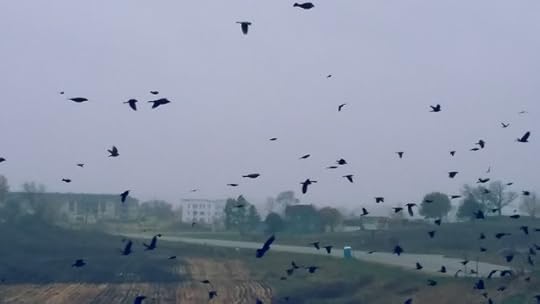
we took a left turn and came upon a giant flock of Redwing Blackbirds. My tiny car startled them, and they all took off in a swirl.
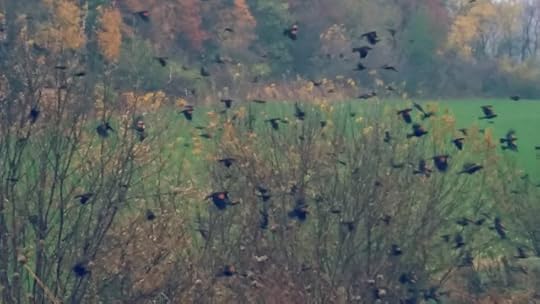
They were my favorite birds, when I was a kid. I was the kind of kid who not only had a favorite bird, but who chose the redwing blackbird as my favorite. So I pulled over and turned back to watch the flock dipping and diving and soaring and swooping all over around the car and the field.
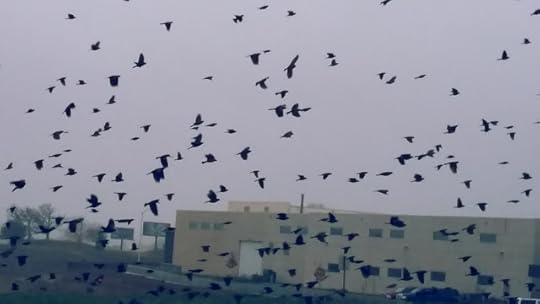
"These were my favorite birds when I was a kid," I told Mr F.
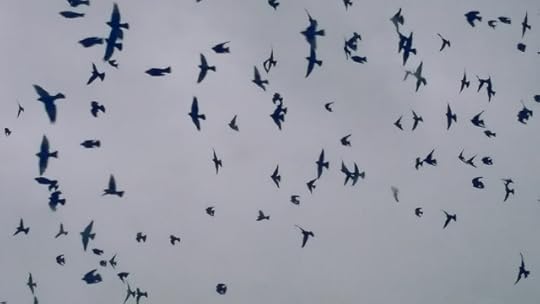
He didn't answer, but that didn't make the moment any less memorable.

we took a left turn and came upon a giant flock of Redwing Blackbirds. My tiny car startled them, and they all took off in a swirl.

They were my favorite birds, when I was a kid. I was the kind of kid who not only had a favorite bird, but who chose the redwing blackbird as my favorite. So I pulled over and turned back to watch the flock dipping and diving and soaring and swooping all over around the car and the field.

"These were my favorite birds when I was a kid," I told Mr F.

He didn't answer, but that didn't make the moment any less memorable.
Published on October 28, 2015 17:37
October 26, 2015
10 Minutes About All The Various Books I Have Been Reading (Or Not Reading)
 So I haven't done this post in a bit and I thought I could just sum up and talk in general about all the books, starting with the two I just started: The Goldfinch by Donna Tartt, and The Laughing Monsters by Denis Johnson.
So I haven't done this post in a bit and I thought I could just sum up and talk in general about all the books, starting with the two I just started: The Goldfinch by Donna Tartt, and The Laughing Monsters by Denis Johnson.I started reading The Goldfinch because of controversy. I heard a lot about it last year when it won the Pulitzer Prize, but that wouldn't have made me want to read it. What made me think about reading it was the discussion over whether it was really a good book at all; this article sums up the discussion, and when I read about why people were arguing about whether it was a good or bad book I decided to give it a try. I'm only about 2 chapters in but so far it's good.
The Laughing Monsters has an even thinner reason for reading it, or thicker, depending. I picked it up solely because I loved Denis Johnson's collection of short stories, Jesus' Son. I've said before that Denis Johnson writes stories as if he were doing a gritty reboot of Damon Runyon's world: the same gangters and crime background but where Runyon's are colorful and fun, Johnson's are desperate and sad and lonely. I have no idea what The Laughing Monsters, a novel Johnson wrote, is about: I'm only two chapters into that, too (on audiobook) but it doesn't matter: already it's gripping. I first put it on when I took Mr F for his ride last night and I thought about extending the ride out to continue listening. It helps that it's set in Africa and involves (apparently) some sort of criminal. I like books set in Africa. (I read Foreign Gods, Inc. a while back and liked that, too, although it's very different from Johnson.)
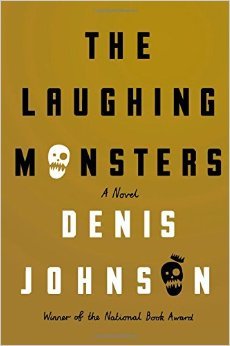 I got to Laughing Monsters after I rejected, on audiobook, Funny Girl by Nick Hornby. Hornby wrote one of my favorite books ever (A Long Way Down) and some other good ones (How To Be Good, Juliet, Naked) but this book got some bad reviews and about twenty minutes in, I wasn't entertained by the story of a woman who is beautiful but who wants to be a comedienne. I also started but gave up on The Uncoupling, by Meg Wolitzer, a book that had an interesting premise but which fell apart so much that I didn't even bother finishing how it ended.
I got to Laughing Monsters after I rejected, on audiobook, Funny Girl by Nick Hornby. Hornby wrote one of my favorite books ever (A Long Way Down) and some other good ones (How To Be Good, Juliet, Naked) but this book got some bad reviews and about twenty minutes in, I wasn't entertained by the story of a woman who is beautiful but who wants to be a comedienne. I also started but gave up on The Uncoupling, by Meg Wolitzer, a book that had an interesting premise but which fell apart so much that I didn't even bother finishing how it ended.The Uncoupling is about a town in which all the women decide to stop having sex with men, about the time a drama teacher decides to stage a play of Lysistrata at the local high school. That sounds kind of hamhanded, and it is. The book is the sort in which a character nobody likes because she is unpleasant is actually named Abby Means. It has the feel of a book that wants to have a message, but the message (if there is one) is muddled.
 I don't feel that every book must convey a theme or have a higher point or a moral or whatever; I read plenty of books whose main point is tell a story. But The Uncoupling was draped in all sorts of symbolism that felt half-baked and overwrought at the same time. There is a veteran of Afghanistan, a kid just out of high school, who dropped out when his girlfriend got pregnant and who later went to war and had his face ruined, and he sort of on-the-spot befriends the hottest girl in school who on-the-spot decides that her refusal to have sex will be a protest of the war in Afghanistan, which causes another character to take the hot girl's role as Lysistrata, only to have her big night ruined (sort of) by all the men in the audience coming on stage to complain that they love their wives so much, why can't they please have sex?
I don't feel that every book must convey a theme or have a higher point or a moral or whatever; I read plenty of books whose main point is tell a story. But The Uncoupling was draped in all sorts of symbolism that felt half-baked and overwrought at the same time. There is a veteran of Afghanistan, a kid just out of high school, who dropped out when his girlfriend got pregnant and who later went to war and had his face ruined, and he sort of on-the-spot befriends the hottest girl in school who on-the-spot decides that her refusal to have sex will be a protest of the war in Afghanistan, which causes another character to take the hot girl's role as Lysistrata, only to have her big night ruined (sort of) by all the men in the audience coming on stage to complain that they love their wives so much, why can't they please have sex?Seriously.
I made it through about 75% of the book, mostly because I had 7 hours of driving in one day and it was the only book on my phone, but it never developed into a story with a coherent theme, and it never became entertaining, either, so I dropped it.
I finally finished It, too, after the fourth go-round on borrowing the audiobook from the library. IT WAS NOT WORTH IT. The book is great for the first 2/3, and then mediocre for about 1/2 of the final third (got that?) before becoming at times gross (there is a scene where all 7 of the 12-year-olds have sex to escape the monster. NOT EVEN KIDDING. I felt like I should be calling the authorities on King), the final battle with It goes on for FAR TOO LONG, and it jumps back and forth confusingly between 1957 and 1985, for no reason that I could tell; like I said the last time I talked about the book, starting the story in 1985 makes the 1957 flashbacks entirely unexciting, since we know everyone survives. The only surprise was that they survive by having sex. As 12-year-olds. In a sewer full of poop.
(Stephen King mentions poop so much in his books that I thought about starting a TUMBLR of each reference to poop he makes. For a guy who is such a great writer, his flaws are stark and large.)
There were sort of throwaway terrible parts to It, too: like how throughout the book [SPOILER ALERTS] King keeps hinting that there is some 'ritual' that will help the 7 kill the monster, and then at the end, when they do the ritual, "It" doesn't die at all -- it just flees further back where two of the kids have to go punch it to death. So what was the buildup with the ritual? Who knows? There's also some sort of weird cosmology where there is a giant turtle that lives in space -- I am 100% not making this up -- and the kids get flung out into space near it (apparently just mentally but still) and the turtle says it can't help them. Also it talks with a bit of a western drawl. I kept thinking of Gamara.
Apparently it took something like four years for King to write It, and it shows. It's like he had a pretty good story that he then just sort of threw everything else he had lying around into. "Hey, kids battling a monster that appears as their worst fears... yeah, good, but it needs a crazy bully and some homoerotic garbage dump scenes and child abuse and a lengthy chapter in which a pharmacist tells a kid that his asthma is all in his mind, which later on will be undermined by suggesting that not only is it not simply psychosomatic but in fact the inhaler is magic, plus why not a giant cosmic turtle?"
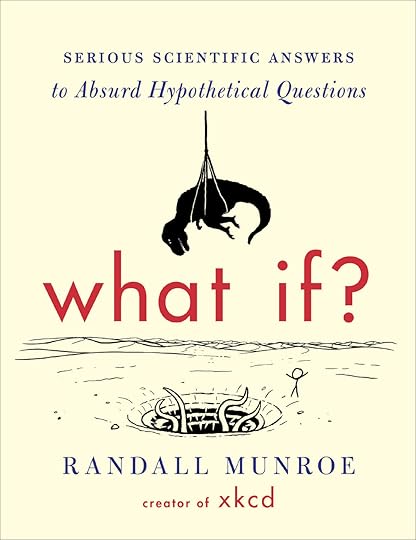 And finally, the book I read in a week was What If? by Randall Munroe, who is the author of the XKCD comic strip. He's a former robotics guy for NASA who quit that job to draw a stick-figure webcomic full time, and then he started writing serious scientific answers to ridiculous questions, like what would happen if the Earth stopped rotating but the atmosphere didn't, or if you threw a baseball at 90% the speed of light, and stuff like that. It's an amazing book, one that might even appeal to people who don't care much for science, but if you do like it, it's one you should pick up now. I had it on my waiting list for a year, and then when we were at the library last week, I saw it on the "new releases" shelf in regular book format, and decided I'd give up my dislike of real books for long enough to read it. I was not disappointed.
And finally, the book I read in a week was What If? by Randall Munroe, who is the author of the XKCD comic strip. He's a former robotics guy for NASA who quit that job to draw a stick-figure webcomic full time, and then he started writing serious scientific answers to ridiculous questions, like what would happen if the Earth stopped rotating but the atmosphere didn't, or if you threw a baseball at 90% the speed of light, and stuff like that. It's an amazing book, one that might even appeal to people who don't care much for science, but if you do like it, it's one you should pick up now. I had it on my waiting list for a year, and then when we were at the library last week, I saw it on the "new releases" shelf in regular book format, and decided I'd give up my dislike of real books for long enough to read it. I was not disappointed.That's the roundup.
Published on October 26, 2015 18:01
Ha ha they literally sold them trash! (*weeps softly for what society has become*)
 While pretty much the worst thing you can say about rich people in terms of their eating habits is that they will pay thousands of dollars to drink coffee made from cat poop, this opening paragraph from a story about fast food's attempts to become healthier is a close second:
While pretty much the worst thing you can say about rich people in terms of their eating habits is that they will pay thousands of dollars to drink coffee made from cat poop, this opening paragraph from a story about fast food's attempts to become healthier is a close second:Like many of their millennial peers, Kathleen Davis and Andrea Nguyen eat out a lot. “Nothing fancy,’’ Davis told me one recent evening, as she took a sidewalk table next to mine at Sweetgreen in Nolita. “We want what we eat to be healthy and tasty,’’ Davis said. “Decent prices matter, too.” The women were working their way through one of the restaurant’s seasonal specialties—the “wastED” salad, which consists almost entirely of carrot peels, broccoli stalks, roasted bread heels, cabbage cores, and other ingredients that are usually tossed out.
There is literally NOTHING you cannot sell rich people. If you take ANYTHING and say it's "exclusive" and/or "healthy" and you mark it up 1,000% they will buy it.
Published on October 26, 2015 05:12
October 24, 2015
This Song Existed: "Music Box Dancer."
I can play this song on piano, by heart.
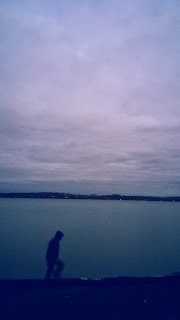 I must have first heard this song in 1978, when it came out. I can remember the 45 record it came on, with a red label. I can remember playing the record on the 'hi fi,' the one that was 8' long, a sort of ivory color, with sliding panels on the top that on the right opened to reveal the record player and on the left would slide back to show a row of 33 and 45 rpm records. The hi-fi was modeled after, I think, the Acropolis, if the Acropolis had been waist-high and in our dining room, where we only ate on New Year's Eve.
I must have first heard this song in 1978, when it came out. I can remember the 45 record it came on, with a red label. I can remember playing the record on the 'hi fi,' the one that was 8' long, a sort of ivory color, with sliding panels on the top that on the right opened to reveal the record player and on the left would slide back to show a row of 33 and 45 rpm records. The hi-fi was modeled after, I think, the Acropolis, if the Acropolis had been waist-high and in our dining room, where we only ate on New Year's Eve.I learned "Music Box Dancer" from my second piano teacher, Mrs. Loppnow, in her house across from St. Charles Church. It's not that difficult a song, actually, to play on piano. I probably learned it at age 8 or 9 or 10 or so. Maybe a little older, but either way, it's just really the same melody played over and over, an octave higher or an octave lower or so, with four chords for the left hand.
I can't tell you what the chords are, now, sitting here in Mr F's room waiting for him to fall asleep, listening to the song and typing this. I can't even tell you what notes are for the melody. But I know them, like I know my own name. If I sit down at a piano, I can start playing the song without thinking about it. It works better if I don't think about it, in fact. If I start to think about what I'm doing, concentrate on it, I'll stumble. I can play the song on a sort of runner's high, watching my hands just go through and do it.
At least I think I can.
I haven't played piano in, probably, five years. That's not by design. We have a piano in our house, Sweetie's old piano that she played growing up, which she had delivered down from her parent's house 15 years ago as an anniversary present for me. It's still semi-tuned, but getting it tuned is on the long list of things we may do someday. Someday.
Even when the piano was in better tune, though, I was drifting away from it. When I used to play piano for fun, back 5 or more years ago, I could play this song, and Chariots of Fire, and Bach's Toccata and Fugue In D Minor, which was one of my favorite songs to play: it's phenomenal. Everyone knows it.
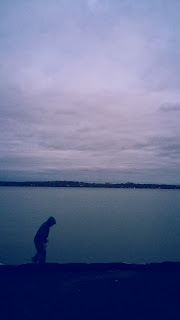 The song itself is also kind of simple, at least the version I learned. But what's so fun about it is it looks amazing when you play it.
The song itself is also kind of simple, at least the version I learned. But what's so fun about it is it looks amazing when you play it.I started wanting to play piano when I watched a piano player on TV. I was about 7 or 8. It's one of the earliest things I can remember: sitting in our living room watching the big old TV. Entertainment in those days was solid: televisions, hi-fi stereos, they were massive. I've got an Ipod the size of a matchbook and I watch TV mostly on my laptop, which weighs about as much as a spiral notebook and is about the same size. When I was a kid, televisions couldn't be moved, hardly. They were huge.
I don't remember who played the piano on TV. I just remember watching his hands as they played on the keys, the way the keys dipped up and down and danced around, the way his fingers flew back and forth. I was mesmerized. I couldn't look away. I wanted to do that.
I never really had that skill, never that knack. I was best when I could memorize a piece of music, like I did with the few songs I can still play, nearly 40 years later. When I could memorize them, songs like The Entertainer or the first movement from Beethoven's Fifth Symphony or Fuur Elise, I could play them the way I wanted to, my hands moving and me just watching, using that part of my brain that lets me walk or breathe or see, the automatic part that knows how things are done. That was my favorite part: just watching my body do something effortlessly, the way my brain and hands worked together to make music.
It was always work for me, until I memorized it. I practiced piano, though, first because I had to and then because I wanted to. It didn't seem like practice. It seemed like learning, which was somehow different. I like learning. If I worked on something long enough, it became a part of me, something that would never leave me. Decades later, my body would remember how to play those songs.
That's amazing, to me, and also sad, a bit. The human body is constantly replacing itself. We are all an experiment, a Ship Of Theseus, slowly rebuilding ourselves. For years and years and years my body rebuilt itself and everytime it did, it kept the part of me that could play those songs, hardwired into my DNA like I could pass it on to my children.
I can't play all the songs anymore. I can still play Music Box Dancer, and Chariots of Fire, and Toccata and Fugue in D Minor. That's the fun one, like I said: at one point your hands cross over each other, playing notes in rapid-fire succession in and out of the fingers of each hand. It's almost impossible to describe how that feels. When I played that part, I would feel like there should be an audience and when I finished the run without a mistake, they should stand up and applaud, cheering and clapping.
I never knew I would grow old. It was only recently that I started to feel like I was getting older. My hair is getting wispier and in one picture not long ago I had a bald spot. There's a lot of gray. My feet hurt all the time and I don't wear jogging shorts to go to the library anymore.
None of that bothers me. What bothers me is losing parts of me I cared about. I can't go jogging anymore; I can't hardly exercise at all. Sometimes I have trouble getting the word I want to come up with, and I pause while I'm talking, trying to remember a name or a song or a book. I sing along with songs using the wrong lyrics without even realizing it.
And I can't play all the songs I used to know by heart. Little pieces slipping away, borne off into the past: dark winter nights sitting at the piano in the living room, plunking away at whatever new piece I was supposed to be working on that week, doing my 20-30 minutes of new stuff so that I could get to the parts I liked, the songs I knew not just by heart but by mind, and play them the way I wanted to.
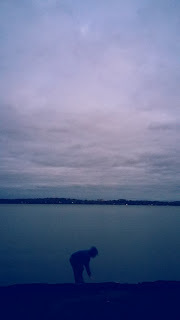 When the last of those songs is gone, I'll be someone entirely new, I suppose. When I finally sit down at the piano one of these days -- if Mr F wasn't still awake I'd have gone down to try it now, but he hates if I leave his room before he falls asleep -- when I finally sit down to try them, someday, and can't play any of them, then I guess the last part of that kid will be gone, and a new person, an entirely new person, will have been built in his stead.
When the last of those songs is gone, I'll be someone entirely new, I suppose. When I finally sit down at the piano one of these days -- if Mr F wasn't still awake I'd have gone down to try it now, but he hates if I leave his room before he falls asleep -- when I finally sit down to try them, someday, and can't play any of them, then I guess the last part of that kid will be gone, and a new person, an entirely new person, will have been built in his stead.Because with everything that goes, something new comes in. That's how it works. I put Music Box Dancer on Youtube tonight, because the song had popped into my head. Along the right hand side of the screen, as it played, I saw other songs by Frank Mills.
"You know?" I said to Sweetie, "I know this will sound kind of dumb, but I've been listening to this song, Music Box Dancer, for nearly forty years. I've always loved it. It's one of my favorite songs of all time. And yet, in that entire time, it never occurred to me that the guy who wrote it, Frank Mills, might have written other songs that I liked."
This song existed as a single entity in my mind: it was born on a vinyl record playing on the hi-fi, and then transformed into sheet music that I laboriously worked at, over and over, over and over, over and over. I learned the melody. I learned the chords. I put them together. Suddenly the song was there, on my piano, and I had lifted it out of the record and off of the paper and into the air in front of me. From there, I breathed it in and made it a part of me, embedded for a half a lifetime so deeply that I can, as I sit here, move my hands over the laptop as though it is a piano and I am playing it.
The song existed as just that: a single song, taking up its spot. Now, years later, as the song itself fades away from me, leaving room for something else, as note-by-note it is carried off into the ether, I am able, while missing it, to replace it with something else and see how that feels.
I am not -- we all are not -- for very long the person we think ourselves to be. We are constantly changing, in big and small ways. Maybe that's why we hold on to some things, like favorite songs: to not let too much of ourselves be swept away at once, to make sure that we can always recognize ourselves.
After I listened to Music Box Dancer, I played this one:
Then I hummed that as I took Mr F out for a walk down to the vacant lot, where we threw some rocks in the lake and looked at the cloudy night sky.
I bet that new song would be fun to play on our piano.

Published on October 24, 2015 18:24
October 23, 2015
(A) I'm glad I was born into the kind of life where I was able to go to college and (B) I am going to have to stop shopping at Amazon...and everywhere else.
Jeff Lockhart took a warehouse temp job because it was the best opportunity he could find....

...Sometime around 2 a.m. that January morning, Jeff took his 30-minute “lunch break.” Most days, he would clock out and go out to his Suburban in the parking lot. He would pull his lunch from his cooler and grab his phone, which, under warehouse policy, wasn't allowed on the floor. He always at least texted Di-Key, who found it hard to sleep while her husband was away at work. On this particular morning, he called her. He asked how her braids had come along, told her that he loved her and that she should get some sleep. Then he said he needed to get back to work.

...Sometime around 2 a.m. that January morning, Jeff took his 30-minute “lunch break.” Most days, he would clock out and go out to his Suburban in the parking lot. He would pull his lunch from his cooler and grab his phone, which, under warehouse policy, wasn't allowed on the floor. He always at least texted Di-Key, who found it hard to sleep while her husband was away at work. On this particular morning, he called her. He asked how her braids had come along, told her that he loved her and that she should get some sleep. Then he said he needed to get back to work.
Less than an hour later, a worker found Jeff on the third floor. He had collapsed and was lying unconscious in aisle A-215, beneath shelves stocked with Tupperware and heating pads.This story about a temp worker who died in his job, and how people end up in those jobs, is sad and also required reading...
Published on October 23, 2015 18:31
October 22, 2015
Throwback Thursday: Catbugs, Revisited
Back in 2010 I used to post weekly about the Saturday Adventures, outings for me and the twins and Sweetie. Here's the one I posted on October 22, 2010. Any comments in red are ones I added today.
Catbugs
Somebody needs to invent a new kind of pants. We've got sweatpants, dress pants, and blue jeans, and none of them is good for doing things like "walking around outside on a borderline-temperature fall day."
"Borderline temperature days" are those days when it's just a little bit too cold for shorts, and a little bit too warm for pants-- so that no matter what you do you're going to be a little uncomfortable. That's what happened to me last week, on the Saturday Adventure, when Sweetie and I took Mr F and Mr Bunches on
The Catbug Trail Nature Walk!
On this particular day, I opted to wear blue jeans, because I'm not going to walk around in slacks,
for Pete's sake, on a nature trail, but I didn't want to be too cold, either. That was a mistake, as you'll see. But before I knew it was a mistake, we set out optimistically, bringing along the soon-to-be-obsolete double stroller because it's about a 1 and 1/2 mile walk to our destination, the highest point in Middleton, Wisconsin. You can see it in the exact center of this picture:
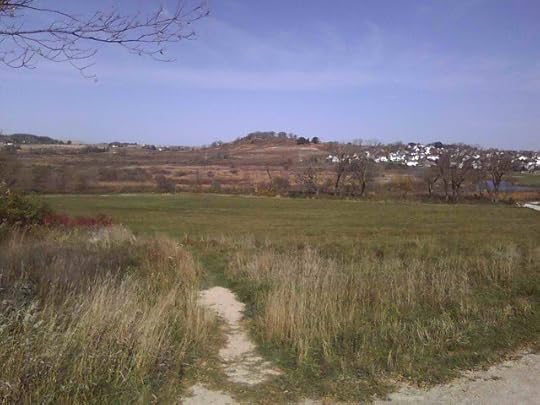 And, no, I don't know it's officially the highest point in Middleton, Wisconsin, but I don't not know that, either, and is it really worth debating?
And, no, I don't know it's officially the highest point in Middleton, Wisconsin, but I don't not know that, either, and is it really worth debating?
To get to the point where we took that picture, though, we first had to walk up the giant hill that leads away from our house. To get to or from our house, you have to go uphill. I know that sounds like the kind of story your grandfather
who wore slacks
told you, but it's true: If we walk anywhere, the walk begins and ends with a strenuous uphill walk, because our house sits off to the side of the top of a tall hill, so you have to drive or walk up that hill, turn onto our road, and then go back down a hill to get to us.
Which means I was already tired and a little hot in my jeans when I took that first picture, and we still had over a mile to go. Luckily, I had a chance to rest and deperspirate (that's a word I invented for when you stand really still until the perspiration on your legs evaporates and your jeans don't stick to you anymore) when we passed a playground on the way; the nature trail goes along the edge of a park for a portion of it, and Mr Bunches wanted to take a moment to go down the slides. So we let him do that, while I rested, before heading on to the rest of the nature trail, where we came across what could be described as a thundering herd of these:
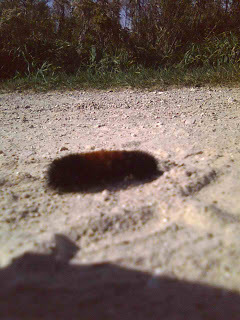
... if caterpillars thundered when they herded around. The trail was full of caterpillars -- all of them trying to head east across the gravelly, sandy trail. It made me wonder what was coming from the west. Was there something they knew that we didn't? A caterpillarocalypse?
I picked up one of them to show Mr F and Mr Bunches. Mr F wanted to hold it but I wouldn't let him -- he's kind of rough and I didn't want him to hurt it. Mr Bunches looked and said: "Bug."
I said "Caterpillar."
He said "Catbug."
So that's what they are now.
We were closer to our goal, but it didn't seem that way. Here was where we had to park the stroller to go up the part of the hill where strollers aren't allowed:
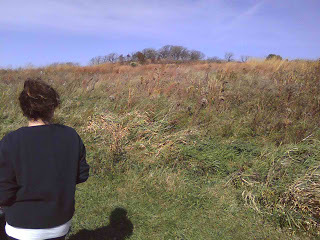
Sweetie said "Is it safe to leave it here?" We were in the middle of a nature reserve, with nobody around. "Who's going to steal a stroller?" I asked, forgetting my upbringing, when I learned that everyone in the world is a thief (which is why I was carrying my wallet in my front pocket even on the nature trail.)
(I don't know why I brought my wallet.)
It didn't really matter is someone did steal the stroller.
Mr F:
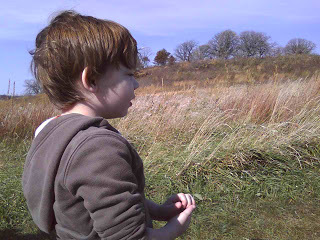 enjoyed the walk up the hill, but that's because he's supermuscular. He likes to jump on Sweetie's exercise trampoline for hours, and as a result has legs that would be the envy of an Olympic high-jumper.
enjoyed the walk up the hill, but that's because he's supermuscular. He likes to jump on Sweetie's exercise trampoline for hours, and as a result has legs that would be the envy of an Olympic high-jumper.
The walk up the hill posed no problem for him.
It nearly destroyed me, as the temperature continued to hover around "You won't be able to make up your mind what to wear" degrees, and I got sweatier and sweatier in my jeans.
Things got a little worse when, near the top of the hill (which is about a 1/2 mile uphill climb) Mr F and Mr Bunches both got tired and I had to carry each of them about 200 yards uphill to get to the top.
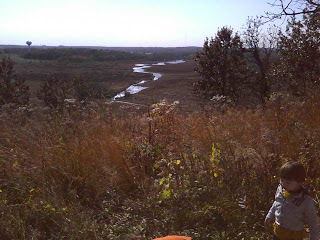
That watertower in the upper left side is where I took the first picture from, just to give you a sense of perspective.
We hung around a few minutes up there, but there's really nothing to do once you've looked out at the scenery and said "Wow, what a view" and "Boy, that's a long walk" and "My legs are sweaty," so we headed back home. I paused to take this picture just before we left:

Because I've always liked the pattern of stark branches against a blue sky.
____________________________________________________________
Catbugs
Somebody needs to invent a new kind of pants. We've got sweatpants, dress pants, and blue jeans, and none of them is good for doing things like "walking around outside on a borderline-temperature fall day."
"Borderline temperature days" are those days when it's just a little bit too cold for shorts, and a little bit too warm for pants-- so that no matter what you do you're going to be a little uncomfortable. That's what happened to me last week, on the Saturday Adventure, when Sweetie and I took Mr F and Mr Bunches on
The Catbug Trail Nature Walk!
On this particular day, I opted to wear blue jeans, because I'm not going to walk around in slacks,
Nobody born after 1952 should ever use the word "slacks." It's like calling a couch a davenport, like my Grandma used to. She also had a fold-out bed davenport, which she called the "Dabble Bed."
for Pete's sake, on a nature trail, but I didn't want to be too cold, either. That was a mistake, as you'll see. But before I knew it was a mistake, we set out optimistically, bringing along the soon-to-be-obsolete double stroller because it's about a 1 and 1/2 mile walk to our destination, the highest point in Middleton, Wisconsin. You can see it in the exact center of this picture:
 And, no, I don't know it's officially the highest point in Middleton, Wisconsin, but I don't not know that, either, and is it really worth debating?
And, no, I don't know it's officially the highest point in Middleton, Wisconsin, but I don't not know that, either, and is it really worth debating?That hill in the middle of the picture is the "Mountain" that led to "Little Park On The Mountain" being called "Little Park On The Mountain." But, weirdly, this mountain is not the mountain Little Park is on. I know, I know. Nothing I say makes sense. You know, if you've got like a JILLION years and want to read another long post you could read "The Naked Boy And The Mountain That Isn't."
To get to the point where we took that picture, though, we first had to walk up the giant hill that leads away from our house. To get to or from our house, you have to go uphill. I know that sounds like the kind of story your grandfather
who wore slacks
told you, but it's true: If we walk anywhere, the walk begins and ends with a strenuous uphill walk, because our house sits off to the side of the top of a tall hill, so you have to drive or walk up that hill, turn onto our road, and then go back down a hill to get to us.
Which means I was already tired and a little hot in my jeans when I took that first picture, and we still had over a mile to go. Luckily, I had a chance to rest and deperspirate (that's a word I invented for when you stand really still until the perspiration on your legs evaporates and your jeans don't stick to you anymore) when we passed a playground on the way; the nature trail goes along the edge of a park for a portion of it, and Mr Bunches wanted to take a moment to go down the slides. So we let him do that, while I rested, before heading on to the rest of the nature trail, where we came across what could be described as a thundering herd of these:

... if caterpillars thundered when they herded around. The trail was full of caterpillars -- all of them trying to head east across the gravelly, sandy trail. It made me wonder what was coming from the west. Was there something they knew that we didn't? A caterpillarocalypse?
It could have been. The actual term for a group of caterpillars is "army." An Army Of Caterpillars.
I picked up one of them to show Mr F and Mr Bunches. Mr F wanted to hold it but I wouldn't let him -- he's kind of rough and I didn't want him to hurt it. Mr Bunches looked and said: "Bug."
I said "Caterpillar."
He said "Catbug."
So that's what they are now.
We were closer to our goal, but it didn't seem that way. Here was where we had to park the stroller to go up the part of the hill where strollers aren't allowed:

Sweetie said "Is it safe to leave it here?" We were in the middle of a nature reserve, with nobody around. "Who's going to steal a stroller?" I asked, forgetting my upbringing, when I learned that everyone in the world is a thief (which is why I was carrying my wallet in my front pocket even on the nature trail.)
(I don't know why I brought my wallet.)
It didn't really matter is someone did steal the stroller.
I miss that stroller so much. Not only was it great for getting through crowds, but it was far easier to go somewhere with the boys before Mr F was a 120-pound linebacker who frequently changes direction, or trys to, without any warning, leaving the person in charge of him with a separated shoulder.The Babies! are 4 years old now, and getting a little big for it; it serves mainly as a way for them to rest if we go somewhere like a nature walk, and it's usually more trouble than it's worth, especially since Mr Bunches, who sits in front, can put his feet down and touch the ground and if he does it hard enough he'll stop the stroller dead in its tracks.
Mr F:
 enjoyed the walk up the hill, but that's because he's supermuscular. He likes to jump on Sweetie's exercise trampoline for hours, and as a result has legs that would be the envy of an Olympic high-jumper.
enjoyed the walk up the hill, but that's because he's supermuscular. He likes to jump on Sweetie's exercise trampoline for hours, and as a result has legs that would be the envy of an Olympic high-jumper.This is still true. We are about 2 weeks away from Mr F being stronger than me. He still jumps, plus he has one of those exercise balls that you sit on only he bounces on it, too. His core is a thing of wonder. He is the most solid, stable kid I know. He's like a block of iron suddenly developed muscles and a strong urge to go that way right now.
The walk up the hill posed no problem for him.
It nearly destroyed me, as the temperature continued to hover around "You won't be able to make up your mind what to wear" degrees, and I got sweatier and sweatier in my jeans.
Things got a little worse when, near the top of the hill (which is about a 1/2 mile uphill climb) Mr F and Mr Bunches both got tired and I had to carry each of them about 200 yards uphill to get to the top.
I used to be able to do that! I once walked a mile carrying both of them, to avoid a fox that was stalking us through a back road. That's a true story, every bit of it. These days, when I try to do yoga only to have an asthma attack so severe that I have to go to the doctor, I think back to those days and tell myself: I WAS ONCE A SUPERHERO.But we made it there -- sweaty jeans legs and all -- and were rewarded with this view:

That watertower in the upper left side is where I took the first picture from, just to give you a sense of perspective.
We hung around a few minutes up there, but there's really nothing to do once you've looked out at the scenery and said "Wow, what a view" and "Boy, that's a long walk" and "My legs are sweaty," so we headed back home. I paused to take this picture just before we left:

Because I've always liked the pattern of stark branches against a blue sky.
____________________________________________________________
So there wasn't much to that adventure, I suppose, but, there you go. That's what I was doing five years ago today.
Published on October 22, 2015 18:43
October 21, 2015
Update On God: God is sort of like a defense attorney or life coach I guess.
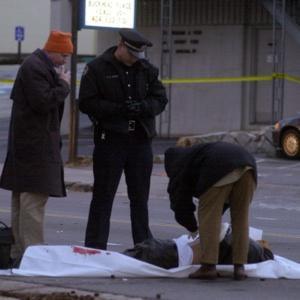 The Atlanta police investigating
The Atlanta police investigatingthe double murder of two men
by Ray Lewis and his friends.A 2013 poll showed that 27% of Americans believe God directly intervenes in the outcome of football games. (30% of Americans, meanwhile, believe there is no point in planning or trying to do much of anything because their fate is in God's hands.) But God apparently does directly intervene in people's lives, or at least in the lives of (allegedly) murderous NFL player-turned-commentator Ray "That Ain't A Knife/This Is A Knife" Lewis. In his new biography Ray says that after he was arrested for obstructing the investigation into a murder that 'happened' right next to him in a fight he was in:
I heard God’s voice. I did. he came to me from somewhere in the darkness of that holding cell—said, “Can you hear me now?” And underneath this voice, in the middle of that darkness, there was a message—came in clear and loud and true. The message: whatever much and more I had to slog through in that jail cell in Atlanta, it would strengthen me. Whatever shadows there were now, hanging over me and my family, it would strengthen me. Whatever dirt these people in law enforcement were determined to do to my name, my standing, my pride, it would only strengthen me. Can you hear me now? Oh yes—yes, I can hear you! Yes!
Ray had been arrested for interfering in the investigation into two as-yet-unsolved murders at a nightclub in Atlanta, a nightclub Ray was at; the two men were in a fight with Ray and his group.
Ray Lewis didn't say whether God had previously told him to hide his bloody white suit in a dumpster outside the hotel, or whether God's advice was that Ray tell everyone in the car to shut up and not talk to the police. Ray was also silent, in his book, about whether it was true his two friends had gone to buy knives the day before the murders, and didn't comment on whether God had any advice about how to deal with the victims' blood being found in Ray's limo.
There is a statue of Ray Lewis put up by the Baltimore Ravens. Ray says he prays every day that God ease the pain of "anybody who was affected by that whole ordeal." His book doesn't say if God answers back.
Ray's victims do not have a statue in their honor.
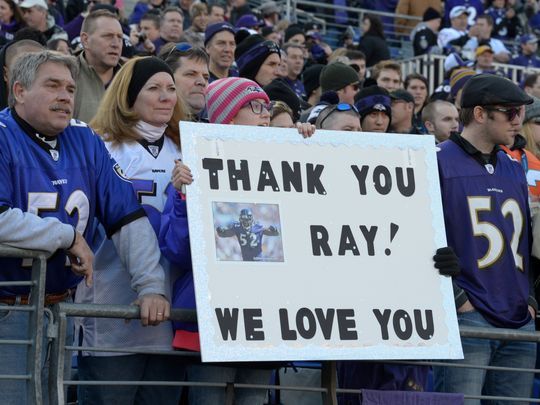
Published on October 21, 2015 04:33
Thinking The Lions
Do you think people invented "Almond Joy" and then thought "we could subtract the almonds and make it a completely different thing?" or did they come up with "Mounds" first and then someone had a brot
Do you think people invented "Almond Joy" and then thought "we could subtract the almonds and make it a completely different thing?" or did they come up with "Mounds" first and then someone had a brother-in-law in the almond business? And anyway did you ever notice that the almond creates a little mound and that "Mounds" are flat?
I'm probably overthinking this. ...more
I'm probably overthinking this. ...more
- Briane Pagel's profile
- 14 followers








